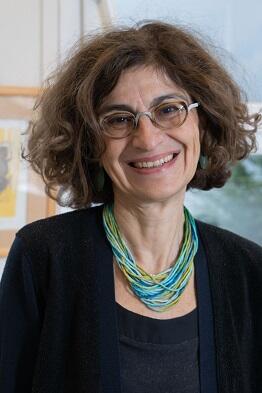
Geneviève Almouzni
Biologist and Director of the Research Center at the Institut Curie
“As a woman in research, we often face unique challenges.”
Geneviève Almouzni is a leading figure in the field of molecular biology. Winner of the 2024 L'Oréal UNESCO International Prize for Women in Science, she exemplifies a career of excellence dedicated to studying DNA and cellular dynamics, with groundbreaking research at the Institut Curie.
Born in Algeria and raised in Alsace, Geneviève Almouzni developed an early interest in nature and science, inspired by simple yet formative experiences, such as observing tadpoles with her mother: “I found it absolutely fascinating to see how they developed in ponds.” This initial curiosity for living organisms quickly evolved into a scientific calling, leading her to a career dedicated to uncovering the mysteries of biology.
After a traditional educational path in Alsace, she enrolled in preparatory biology classes in Strasbourg and later joined the École Normale Supérieure de Fontenay-aux-Roses. There, she discovered innovative aspects of molecular biology and benefitted from the guidance and support of mentors like biologist Claude Desplan, based in the United States.
An International Career Before Returning to France
After earning a teaching qualification in biochemistry and biological engineering, she pursued a master’s degree at the Institut Jacques Monod, followed by a PhD in the laboratory of molecular biologist Marcel Méchali, who had recently returned from Cambridge to start his team. “At the time, I was working on Xenopus, a fascinating amphibian. It felt like a return to childhood and exploring tadpoles, in a way.” The circle was complete. She adds, “That’s when I became interested in the organization of DNA in the nucleus and its dynamics during development and across different cell types.”
Her desire to delve deeper into the organization and function of the genome led her to complete a postdoctoral fellowship in the United States, at the laboratory of Alan Wolffe, a leading figure in the field at the National Institutes of Health (NIH), the U.S. national agency for health and biomedical research. “Alan Wolffe was just starting his team at the NIH, coming from Donald Brown’s renowned group, which had conducted significant work on in vitro transcription systems,” she explains. There, she expanded her research on chromatin organization and its functional implications, integrating transcriptional approaches with chromatin organization.
Although drawn to the dynamic scientific environment in the United States, Geneviève Almouzni chose to return to France, motivated by career development opportunities at the CNRS and her attachment to French culture: “I was eager to return to France. I also had my son during this time, and it was important for him to be closer to my family.” With support from a young research team grant, she established her own research group at the Institut Curie in a stimulating environment. There, she continued her research in epigenetics and cell biology.
A Role Model for Young Women Scientists
Throughout her career, Geneviève Almouzni has been actively involved in teaching and training young scientists with an international focus. Her commitment led her to create, with the support of Sorbonne University and the EpiGeneSys network of excellence, the first international epigenetics course at the Institut Curie, a program now celebrating its 20th edition. “Teaching has always fascinated me,” she notes. “During my PhD, I taught courses at Pierre and Marie Curie University, now Sorbonne University.” At the Institut Curie, she developed an education unit, which she coordinated for many years.
Last spring, Geneviève Almouzni received the L'Oréal-UNESCO International Prize for Women in Science, an award that deeply resonated with her journey. “As a woman in research, we often face unique challenges. For instance, I had to navigate the difficulties of balancing my career with motherhood without adequate support systems. Receiving this award was particularly moving, as it encouraged many young women to tell me how important it is for them to have female role models to look up to.”
If this recognition inspires other young women to pursue scientific careers, Geneviève Almouzni will have fully fulfilled her role.
By Pauline Ponchaux
1 - La chromatine est la forme sous laquelle se présente l'ADN dans le noyau de la cellule
France 2030: Cell Identity and Fate, the Cell-ID Project
Geneviève Almouzni serves as the scientific director of the PEPR Cell Identity and Fate (Cell-ID) research program. Led by the CNRS and Inserm, the program already involves over thirty teams and is funded with €50 million by France 2030 over seven years. “We aim to understand how cells specialize during an organism’s development and how they can deviate from the norm in pathological conditions,” she explains.
This project focuses particularly on brain diseases, including certain pediatric cancers, with the goal of adapting these techniques to other pathologies. The program aspires not only to advance fundamental research on cellular identity but also to explore potential clinical applications in pediatric oncology. “We also have a strong training component. We plan to recruit PhD students and postdocs with the aim of training them in interdisciplinary methods and fostering collaborative approaches that will be essential for the future.”
